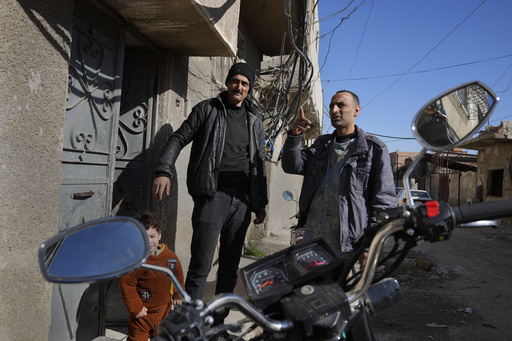
ZAMALKA, Syria — A family in Syria continues to grapple with the trauma of surviving a chemical attack that occurred on August 21, 2013, resulting in the deaths of hundreds near Damascus. The Arbeeni family, residing in Zamalka, recounts the harrowing experience that still lingers in their memories, as they were forced to seek refuge from a gas attack that devastated their neighborhood. At the time, the governing forces under President Bashar Assad were blamed for this tragic event.
The chemical attack struck several suburbs around Damascus, with Zamalka being one of the hardest hit. The deadly nerve agent, known as sarin, was deployed during the assault, a toxin so potent that it can take lives within minutes. While the Syrian government denied involvement and attributed the attack to opposition factions, it was widely recognized that Assad’s military was the only faction in the ongoing civil war with access to such weapons. In response to the crisis, the United States expressed strong disapproval, threatening military action and labeling the use of chemical weapons a “red line” under President Barack Obama.
Hussein Arbeeni, the family’s 41-year-old patriarch, vividly recalls the terror of that night. Explosive missiles landed near their house, failing to explode yet leaking toxic gas into the air. As the noxious fumes invaded their home, the family endured severe breathing difficulties, along with burning sensations in their eyes and rapid heart rates. In a frantic attempt to survive, 23 family members and a neighbor squeezed into the only windowless room of their home. They barricaded the door with tape and dampened cloths, rolling them under the door to block the gas from entering. Hussein even covered the keyhole with tape to seal off any potential infiltration.
Earlier that year, local emergency responders known as the White Helmets had shown community members how to prepare for a chemical attack. They advised residents to shield their mouths and noses with cloths soaked in a vinegar solution, a strategy the family desperately adhered to as they endured an agonizing three-hour wait. “It is all because of God and this locked room,” Hussein reflected, crediting their survival to their improvised sanctuary.
Eventually, as dawn broke, members of the White Helmets located the Arbeeni family and urged them to evacuate immediately. They rushed into the streets, only to be confronted by the tragic sight of lifeless bodies lying in the aftermath of the attack. A passing truck aided their escape, while paramedics assisted their neighbor, who had succumbed to shock.
Khadija Dabbas, Hussein’s 66-year-old mother, expressed her fear: “I was scared to look.” Following a few weeks spent away from Zamalka for safety, the family returned home. Despite international threats against the Assad regime, the situation evolved towards a diplomatic agreement that would result in Russia-assisted disarmament of his chemical stockpiles. However, skepticism grew as reports suggested that the government retained some of those weapons and continued to perpetrate attacks, including a chlorine gas assault in Douma in 2018 that claimed 43 lives.
Now, Hussein carries the memories of those who lost their lives on that fateful day and is determined to seek justice. He wishes for the “harshest punishment” for the perpetrators of the Zamalka attack, particularly advocating for the victims, including innocent children. His thoughts often drift to his son Laith, who was just a baby when their lives were altered forever.
The political landscape in Syria is experiencing significant upheaval as the militant group Hayat Tahrir al-Sham (HTS) recently advanced from its northern foothold, overthrowing Assad’s regime. Their promises to bring past officials to justice for their crimes could signal a new chapter for Syria, yet the uncertainty of what lies ahead persists. Human Rights Watch’s deputy director, Adam Coogle, asserted that the fall of Assad’s government opens up potential avenues for justice for atrocities committed, but emphasized the need for new authorities to take immediate action to safeguard evidence and prioritize accountability.
Recently, a small group paid respects at the Martyrs Cemetery in Zamalka, honoring those lost during the prolonged conflict that ravaged Syria for nearly 14 years. Among the graves, Arbeeni’s brother, Hassan, pointed to a mass grave marked solely with the words “August 2013.” “The martyrs of the chemical attack are here,” he declared, offering a prayer for those who perished.

